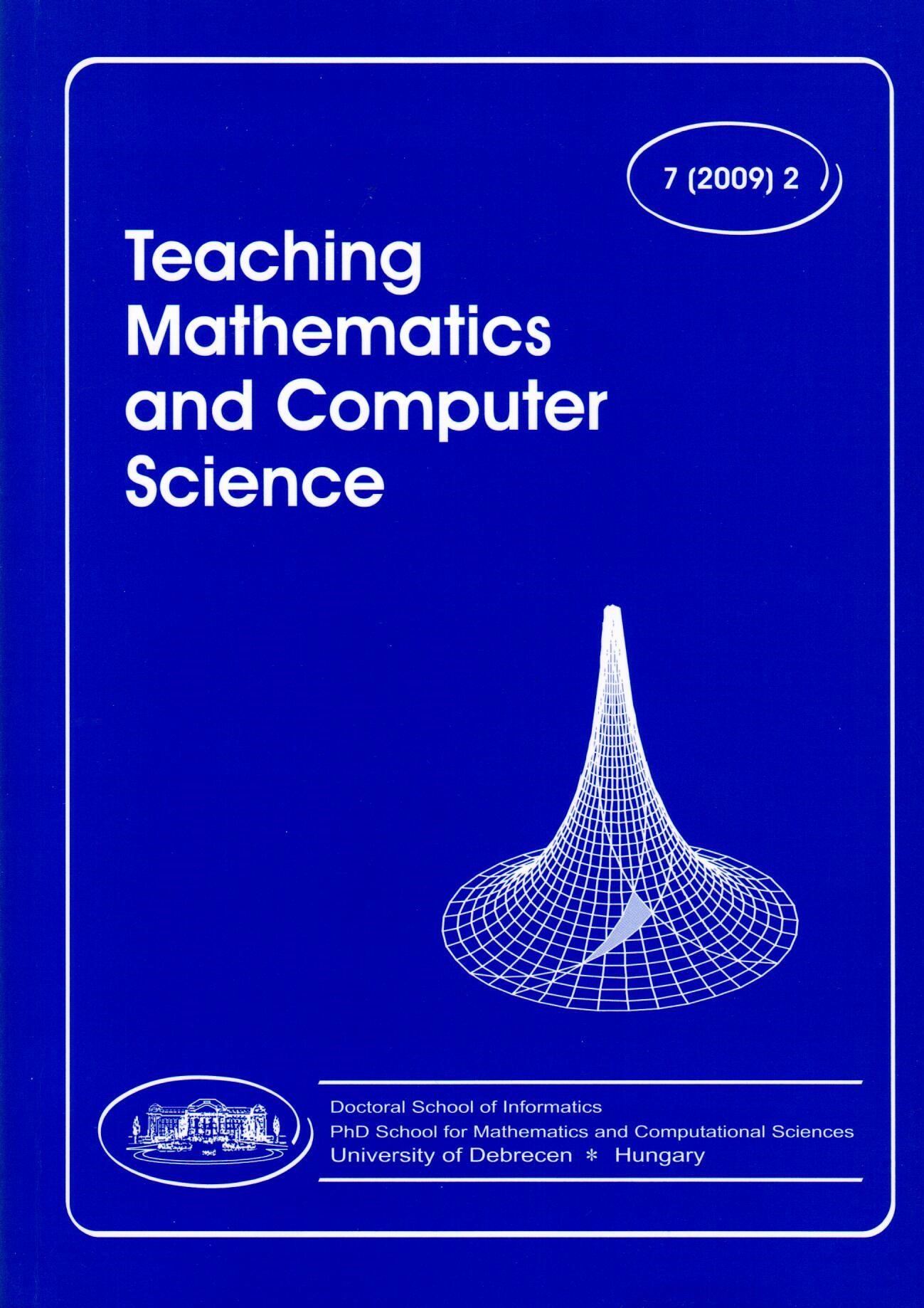Vol. 7 No. 2 (2009)
Published
2009 December 1
##issue.tableOfContents##
Articles
-
Designing a 'modern' abacus for early childhood mathematics
187-199Views:124In this paper, the design of a multi-material, the 'modern' abacus ('modabacus'), for developing early childhood mathematics, is proposed. Presenting the main theories for the design of educational materials as well as similar materials and their educational use, it appears that a new material is needed. The 'modabacus' would be an apparatus which could serve as a multi-material for acting out mathematical tasks as well as a material that could hopefully overcome the limits and restrictions of traditional abacuses and counting boards.PDF49 -
Forming the concept of parameter with examples of problem solving
201-215Views:146Pupils are encountering difficulties with learning algebra. In order for them to understand algebraic concepts, particularly the concept of parameter it was decided by the teacher of mathematics and Information Technology to integrate the teaching of these two subjects. The aim of this study is to investigate whether, and to what degree, software can be useful in process of forming the concept of parameter. This longitudinal study was conducted in a junior high school (13-16 year old children) using different computer programs.PDF63 -
Zur Visualisierung des Satzes von Pythagoras
217-228Views:99In this article we make a study of a not-classical visualization of the theorem of Pythagoras using methods of elementary school geometry. We find collinear points, copoint straight lines and congruent pairs of parallelograms. The configuration of their midpoints induces a six-midpoint and a four-midpoint theorem.PDF (German)45 -
Summe einer unendlichen geometrischen Reihe im Mathematikunterricht
229-240Views:108This article deals with sums of infinite geometric series. We focus on the understanding of the notion by pupils at secondary school through generic and universal models. In the first part we survey this notion in the Czech and Slovak curriculum. We describe the process of gaining knowledge as a sequence of five stages. In the second part we show one possible approach how to introduce the notion "sum of the infinite geometric series" through this process. We illustrate this on some examples for pupils. At the end we formulate some pedagogical recommendation for teachers.PDF (German)78 -
Examining continuity/discontinuity of a function by using GeoGebra
241-257Views:187The possibility to visualize the things with the help of today's dynamic software (GeoGebra being one of them), enables the students to see and explore mathematical relations and concepts that were difficult to be presented in the past, prior to the state-of-the-art technologies. In methodological sense, the contribution of this paper lies in the presentation of a set of visualizations designed to help students better understand and explore the basic calculus concepts such as continuity at a point, to examine discontinuity at a point, to display discontinuities and the relations between continuity and differentiability of single variable functions. In technical sense, this paper presents creative GeoGebra applets which offer new possibilities that could be of a vital importance for the future development of e-learning of College mathematics.PDF152 -
Teaching geometry using computer visualizations
259-277Views:113In this work we study the development of students' creativity using computer-aided-teaching during IT classroom. Teaching geometry in Bolyai Grammar School specialized natural science classes is not an easy task. Here is introduced a new didactic means of teaching geometry which nevertheless requires the same effort to understand the material, but uses a different more active method to familiarize students with the topics. Traditional methods, and the use of compasses and rulers are not omitted either, as they develop the students' motor skills.PDF91 -
Cognitive conflict as a tool of overcoming obstacles in understanding infinity
279-295Views:123This paper, based on current research, is devoted to obstacles that appear in the process of understanding the concept of infinity. In its introductory part the fundamental types of epistemology obstacles are formulated. The cognitive conflict and its role in overcoming these obstacles are analysed in the following section of this research. Finally, the authors focus on research methodology and the results of the three-year research project. The problems are illustrated by means of real experimental interviews.PDF49 -
Comparison of teaching exponential and logarithmic functions based on mathematics textbook analysis
297-318Views:165Exponential and logarithmic functions are key mathematical concepts that play central roles in advanced mathematics. Unfortunately these are also concepts that give students serious difficulties. In this paper I would like to give an overview – based on textbook analysis – about the Hungarian, Austrian and Dutch situation of teaching exponential and logarithmic functions. This comparison could also provide some ideas for Hungarian teachers on how to embed this topic in their practice in another more "realistic" way.PDF131
Keywords
Issues by Year
2020
2017
2011
2010
2009
2007
2006
2005
2004
2003







